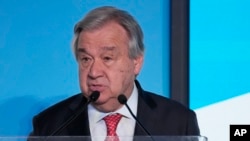U.N. Secretary-General Antonio Guterres said Thursday that it is not too late to “stop the worst” of the climate crisis, but only with “dramatic, immediate” action.
“The era of global warming has ended; the era of global boiling has arrived,” Guterres told reporters at U.N. headquarters in New York, where the temperature outside was approaching 86 degrees Fahrenheit before 10 a.m. and set to hit 91 degrees Fahrenheit later in the day.
He spoke as the World Meteorological Organization and the European Commission’s Copernicus Climate Change Service released new data confirming July is set to be the hottest month ever recorded.
“According to the data released today, July has already seen the hottest three-week period ever recorded; the three hottest days on record; and the highest-ever ocean temperatures for this time of year,” Guterres said.
The U.N. chief, who has been ringing the alarm bell on the climate crisis since he entered office in January 2017, noted it has been a difficult summer in many parts of the world because of climate-related events, including fires, floods and scorching heat.
“For the entire planet, it is a disaster,” he said. “And for scientists, it is unequivocal – humans are to blame.”
He said the rising temperatures are consistent with all the scientific predictions; the only surprise is how fast it is happening.
He acknowledged progress on renewable energies and positive steps from industrial sectors but warned that none of it is going far or fast enough.
“Accelerating temperatures demand accelerated action,” the U.N. secretary-general said.
Guterres called for ambitious new national emissions reduction targets from G20 countries — as they are responsible for 80% of global greenhouse gas emissions. He urged developed countries to reach net zero emissions as close as possible to the target date of 2040, and emerging economies by 2050.
He also repeated his mantra that there must be a transition away from fossil fuels to renewables.
“And we must reach net zero electricity by 2035 in developed countries and 2040 elsewhere, as we work to bring affordable electricity to everyone on Earth,” the secretary-general noted.
He said countries on the climate “frontlines” — who have contributed the least to the climate crisis — need financial help from developed nations for adaptation and mitigation. Developed countries have committed to contributing $100 billion per year to help developing countries, but they have fallen short. Guterres urged them to honor those commitments.
In September, the U.N. chief will convene a Climate Ambition Summit on the sidelines of the General Assembly high-level week, ahead of November’s two-week long climate review conference — COP28 — in Dubai.




